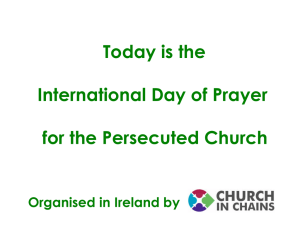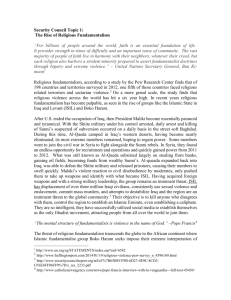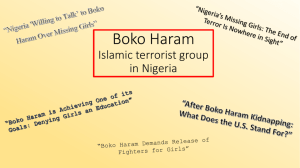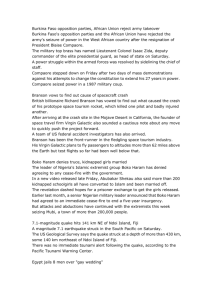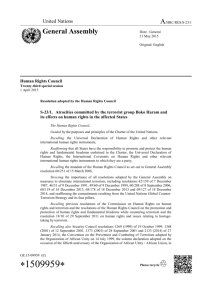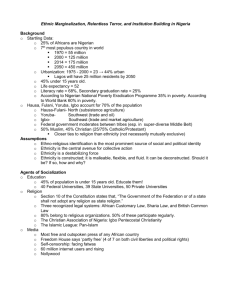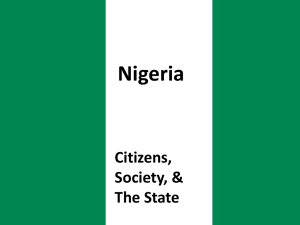Boko Haram Background: Boko Haram, whose name colloquially
advertisement
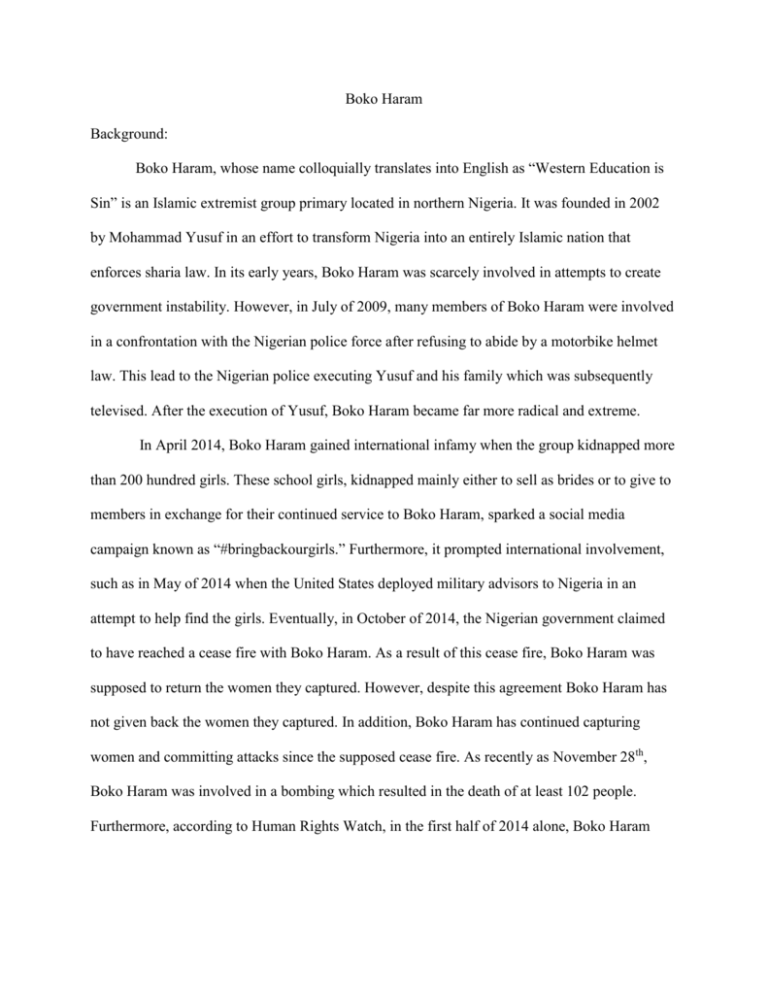
Boko Haram Background: Boko Haram, whose name colloquially translates into English as “Western Education is Sin” is an Islamic extremist group primary located in northern Nigeria. It was founded in 2002 by Mohammad Yusuf in an effort to transform Nigeria into an entirely Islamic nation that enforces sharia law. In its early years, Boko Haram was scarcely involved in attempts to create government instability. However, in July of 2009, many members of Boko Haram were involved in a confrontation with the Nigerian police force after refusing to abide by a motorbike helmet law. This lead to the Nigerian police executing Yusuf and his family which was subsequently televised. After the execution of Yusuf, Boko Haram became far more radical and extreme. In April 2014, Boko Haram gained international infamy when the group kidnapped more than 200 hundred girls. These school girls, kidnapped mainly either to sell as brides or to give to members in exchange for their continued service to Boko Haram, sparked a social media campaign known as “#bringbackourgirls.” Furthermore, it prompted international involvement, such as in May of 2014 when the United States deployed military advisors to Nigeria in an attempt to help find the girls. Eventually, in October of 2014, the Nigerian government claimed to have reached a cease fire with Boko Haram. As a result of this cease fire, Boko Haram was supposed to return the women they captured. However, despite this agreement Boko Haram has not given back the women they captured. In addition, Boko Haram has continued capturing women and committing attacks since the supposed cease fire. As recently as November 28th, Boko Haram was involved in a bombing which resulted in the death of at least 102 people. Furthermore, according to Human Rights Watch, in the first half of 2014 alone, Boko Haram killed 2,053 civilians. All of this has occurred after public interest in Boko Haram has substantially subsided in the post #bringbackourgirls campaign. Boko Haram is a particularly difficult threat because it has a variety of aspects which make it difficult with which to negotiate. First and foremost, questions exist as to the leadership of Boko Haram. The believed leader of Boko Haram is Abubakar Shekau. However, there is debate to the level of control that Shekau actually has. To start, Boko Haram is actually believed to not be one unified group but instead to be split into at least 5 different fractions. While some of these groups are believed to believe in Yusuf’s ideology and goal in seeking an Islamic Nigerian state, many of the other fractions are believed to instead be seeking international terror and notoriety. In addition, parts of Boko Haram are believed to be attempting to associate with foreign terrorist groups such as Al Qaeda. Boko Haram has even committed a few acts of terror outside of Nigeria, such as when they kidnapped the Vice Prime Minister of Cameroon’s Wife in July of 2014. This furthers the threat presented by Boko Haram because these international acts do not aid in the creation of an Islamic Nigeria, thus revealing an expanse of endeavors. Finally, even the existence of Shekau is questionable. While many countries seek the execution of Shekau, the Nigerian government has already claimed to have executed Shekau on two separate occasions. However, shortly after both supposed executions Shekau reappeared on Boko Haram video encouraging continued action from the terrorist group. As a result, a significant question which exists is whether or not Shekau is actually alive. Shekau may still be alive with the Nigerian government having falsely reported his death. However, Boko Haram may just be using similar looking individuals and disguising them as Shekau for use as propaganda. If the latter is true then significant questions exist as to who is truly in charge. UN Involvement: The United Nations is heavily involved in tackling the threat presented by Boko Haram. Furthermore, they are involved in many facets of the conflict. First, the UN is involved in the threat that Boko Haram places on the stability to surrounding regions. One of the primary consequences that the Boko Haram attacks within Nigeria has placed on surrounding regions, particularly Niger has been the refugee overflow into these surrounding regions. As a result, the UNHCR has been heavily involved in helping to address the refugee issue. In addition, the UN has conveyed full support for the Nigerian government. It plans to make future efforts towards aiding the Nigerian government to fully combat the terrorism within it. One of the primary ways in which the United Nations has addressed the issue of Boko Haram has been through the United Nations Security Council. In May of 2014, the UN Security Council attempted to address the threat presented by Boko Haram. As they had previously done with many Al Qaeda terrorist members, the Security Council decided to sanction many individuals involved with Boko Haram. Perhaps more surprising is that the Security Council’s decision to sanction various individuals involved with Boko Haram was not due to their involvement in terrorist attacks within Nigeria, but instead due to their relationship with Al Qaeda. The Security Council primarily underwent the action through their Al Qaeda sanctions commit, therefore targeting members involved with both entities and Boko Haram’s financial relationship to Al Qaeda. However, despite the UN taking this step to combat the spread of Boko Haram through financial assets, the UN Security Council has yet to pass an actual resolution on the topic of Boko Haram. In fact, while many of the individuals targeted were due to their link to Al Qaeda, the decision to sanction Boko Haram also came in response to the social media campaign #bringbackourgirls. Questions to Consider: 1. How can a resolution be reached in a situation in which leadership is unclear? 2. How has your country dealt with terrorist groups in the past? 3. What has influenced Boko Haram’s actions and how can these be address? 4. Can the Nigerian government properly handle Boko Haram? 5. Do measures to address Boko Haram need to be implemented outside of Nigeria? 6. Should Nigeria be responsible for creating the cease fire or should it be the UN?
